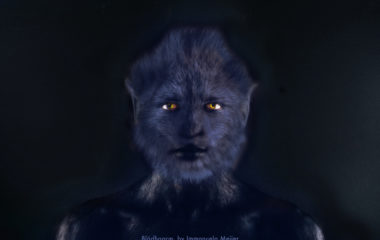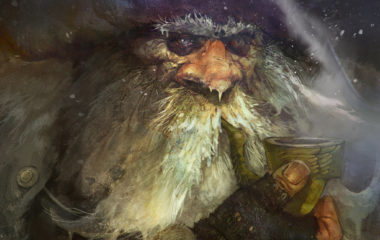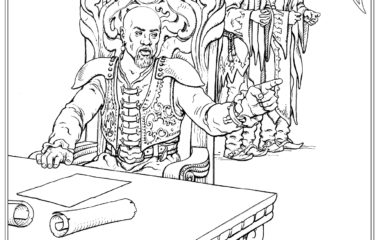
“Worry about what you can change, and leave the rest to sort itself out, eh?” ~ Orik
Orik’s parents died of the pox when he was very young, so he was raised by his uncle, King Hrothgar, as his only child and heir.
Dwarves mature at a slower rate than humans, and this was certainly true for Orik. Hrothgar sent his thirty-four-year-old adopted son to do labor in the Forest of Stone with the goal of teaching the rambunctious youth a lesson. Orik was so bored after several months that he ran a way and joined a group of Vrenshrrgn. While drunk, he promised his new friends to hunt a Nagran for Hrothgar in the hope that it would appease his anger. It was a terrifying experience once sober. Orik managed to kill a boar but not before getting gored in the shoulder and tossed into the trees. The Vrenshrrgn carried both the deceased boar and the injured dwarf back to Bregan Hold, where Orik spent a month recuperating, confined to bed rest. Fortunately, Hrothgar felt that this was punishment enough for defying his orders.
Orik eventually grew into an excellent leader loyal to his king. Because of the Varden presence in Tronjheim, he was often stationed in the ancient city, which suited him nicely since he preferred to be underground. Just prior to the events of the Inheritance Cycle, Orik became engaged to Hvedra.
A New Rider
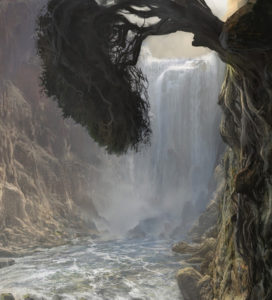
Life changed when Eragon, Saphira, Murtagh, and Arya desperately sought entry to Farthen Dûr at Kóstha-mérna’s secret gate, hotly pursued by a group of Kull. Orik was on patrol when he realized that one of the Twins refused to let the Rider and his companions access. He overrode the man’s orders and opened the doors, rescuing Eragon from drowning. Later Orik was forced to intervene again when the Twin refused to admit Arya for immediate medical care, and then once again when the Twin was overly aggressive reading Eragon and Murtagh’s minds (the latter refused to cooperate).
The Twin kept the Rider and his friends in a cell overnight. Later Orik accompanied them to an audience with Ajihad. It was a precarious situation for Orik—he had disobeyed a direct order from a Varden commander in order to save Eragon, Arya, Murtagh, and Saphira’s lives. But Ajihad dealt with the problem cleverly; Orik was removed from military duty and entrusted with the care of Eragon and Saphira. It was exactly what the dwarf wanted:
“Ajihad is a good leader. He understands how to keep the law yet remain just. I have been punished by his command, but I’m also one of Hrothgar’s subjects. Under his rule, I’m still free to do what I wish.” (Orik, Eragon Deluxe, page 420)
That said, Hrothgar warned Orik not to interfere again, as there would be no way to protect him from further consequences.
Eragon and Saphira enjoyed their time with Orik, and through him learned much about the dwarves and the history of Farthen Dûr and Tronjheim. King Hrothgar also summoned them for a brief audience, which went well, much to Orik’s relief.
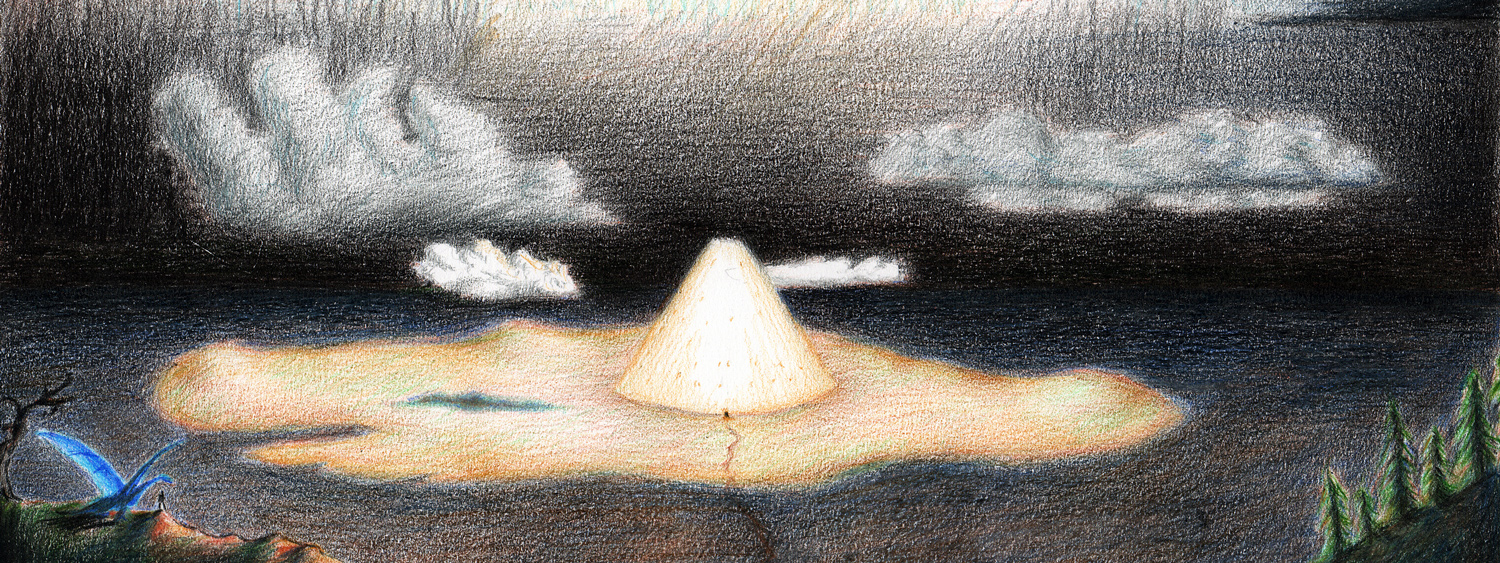
Soon word reached Tronjheim that an army of Urgals led by Durza were sneaking through the tunnels to attack the capital city. Everyone made preparations for the confrontation. Orik presented Saphira and Eragon with armor, princely gifts from Hrothgar. That done, it was just a waiting game.
The Varden won the Battle of Farthen Dûr. In the days following, Orik was dismayed to witness Ajihad’s death at the hands of a Kull raiding party (later revealed to be under the command of the Twins). Orik summoned Eragon and Saphira for a meeting with Hrothgar; power was shifting and the king wanted to know who Eragon would back. The Rider named Nasuada, much to Hrothgar’s approval.
During the audience, Saphira also offered to repair Isidar Mithrim, which had been broken during the battle. Hrothgar, Orik, and the dwarves were overjoyed that she could and would do such a thing; with the exception of the king, they kissed the floor in front of her in thanks. Later Orik and hundreds of other dwarves feasted with Eragon and Saphira, not only celebrating the end of the Battle of Farthen Dûr but also the eventual repair of the star-sapphire. Rider and dragon drank far too much, providing ample ammunition for stories of their antics.
The next day Orik had to spend nearly an hour trying to wake Eragon and Saphira where they had passed out in the dining hall. He brought a change of clothes with him for Eragon—Ajihad’s funeral would begin shortly.
Nasuada’s subsequent election went as planned. Orik warned Eragon that his political maneuvering to pledge his support had earned him some enemies in the process.
Journey to the North
Eragon, Saphira, and Arya needed to travel to Du Weldenvarden to reestablish contact with the elves and further the young Rider and dragon’s training. Hrothgar asked Orik to accompany them as a representative of dwarven interests. Besides the fact that it would delay his spring wedding, there were other reasons Orik wasn’t too thrilled to visit the elves homeland:
“Of all the races, elves change the least, which is one reason I’m reluctant to go . . . Urgent tasks remain in Tronjheim and our other cities, yet I must tramp across Alagaësia to exchange pleasantries and sit and grow fat as you are tutored. It could take years!” (Eldest Deluxe, page 80)
Before the group left, Orik gave Eragon his newly repaired armor, explained that Saphira’s had been entrusted to the Varden, and offered Hrothgar’s greatest gift yet: to adopt Eragon into Ingeitum, an honor that had never been extended to a human before. Eragon accepted, so Orik swore the young man into the clan. The two friends were now foster brothers.
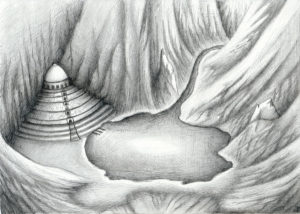
The first stop was Tarnag where they stayed with clan chief Ûndin. The Az Sweldn rak Anhûin—enraged Eragon had been adopted into Ingeitum—declared a blood feud with him. Because of this, the travelers’ stay was more than a bit tense. Orik reassured Eragon that Ingeitum supported the Rider, but it wasn’t terribly reassuring when an entire clan had just sworn him as their enemy.
From Tarnag, the group—now bolstered with Ûndin’s guards Ama, Tríhga, Hedin, Ekksvar, Shrrgnien, Dûthmér, and Thorv—floated to Hedarth. Orik used his Urgal horn bow to hunt on occasion. Along the way, Orik told Eragon of how Brom founded the Varden, of Ascûdgamln, and of Fanghur. Eragon also continued to struggle with his injured back, a token of the Shade Durza before his death. The dwarves expressed concern and Eragon responded poorly. Orik reprimanded the Rider by explaining:
“Thorv and his men were sent to protect you and Saphira. They will die for you if need be, and trust their sacred burial to you. You should remember that . . . It’s a lesson that every commander must learn. I had it beaten into me by Hrothgar after I threw my boot at a dwarf who left his halberd where someone could step on it . . . I broke his nose.” (Eldest Deluxe, page 153)
Eragon understood, and Orik gave him a puzzle ring, one that the dwarf had found a helpful distraction when troubled.
Once at Du Weldenvarden’s borders, Ama, Tríhga, Hedin, Ekksvar, Shrrgnien, Dûthmér, and Thorv returned to Tarnag, while the remaining party members proceeded deeper into the woods with their new elven escorts. Orik and Eragon were already fast friends, and this only solidified as they traveled. The dwarf was good humored and often joked about some of the elves’ odd tendencies. He was not so amused when his mind was befuddled during Dagshelgr, an elven fertility festival that encouraged the forest and its residents to propagate: “I’ll not be controlled against my will by magic. If it happens again, Arya, I swear on Helzvog’s stone girdle that I’ll return to Farthen Dûr and you will have the wrath of Dûrgrimst Ingeitum to deal with.” (Eldest Deluxe, page 214) Arya had already cast a spell to block the festival’s effects on Orik and Eragon, but the warning was noted.

Training
The group finally made it to Ellesméra. Queen Islanzadí welcomed them, including her daughter . . . Arya. It wasn’t the last surprise of the trip for Orik, who—after hesitantly swearing to secrecy in the ancient language—was even more shocked to discover the existence of Glaedr and Oromis. He wondered why the two had hidden all this time when the need for a free Rider was so great. The initial reason—that someone needed to train subsequent Riders—left Orik labeling the elder a coward. Fortunately Oromis wasn’t offended and revealed his disability as further explanation. Stricken, Orik apologized for his accusation.
For the weeks that followed, Orik mostly entertained himself in Tialdarí Hall where he was staying while Eragon and Saphira trained. He eventually got drunk on faelnirv and went in search of Eragon to catch up. The two exchanged details of their personal lives, and the young Rider confided his infatuation with Arya. Orik slipped away in the wee hours of the morning after a drunken nap next to Eragon.
It was important to verify that Eragon was receiving the training the elves promised, so Orik insisted on observing a lesson; this was unusual, as Riders guarded their secrets jealously, but Orik’s reasons were sound, so Oromis consented. The lesson was cut somewhat short when Eragon created a fairth that revealed his feelings for Arya, much to her anger and discomfort. Orik left at Oromis’s request, telling Eragon he was free to talk if the young Rider needed. In the coming days, Orik occasionally observed lessons from a distance.
Arya and Eragon eventually restored their friendship somewhat, though she would occasionally ask Orik to accompany the two on walks to ensure there was no further opportunity for Eragon to make misguided advances.
Soon it was time for the Agaetí Blödhren, so Eragon followed Oromis’s instructions to place wards on himself and Orik in order to protect themselves from the extreme effects of the elves’ magic. As the festivities started, Orik was in awe of meeting the legendary smith Rhunön, who spoke dwarvish and invited him to visit her home, view her work, and discuss metalworking. Attendees were required to fashion a gift for the proceeding, and the elves were delighted with his contribution to the ceremony, “A tiered wood pyramid eight inches high and constructed of fifty-eight interlocking pieces.” (Narrative, Eldest Deluxe, page 460)
But the revelry was not the highlight of the evening. The greatest moment came when the spectral dragon—summoned during the Caretakers’ ceremony—healed Eragon’s back injury and enhanced his physical abilities to match those of the elves.
Orik watched the Rider’s next sparring session to see how the changes would affect the Rider’s performance; it was a remarkable difference that would give the Varden a fighting chance against Galbatorix.
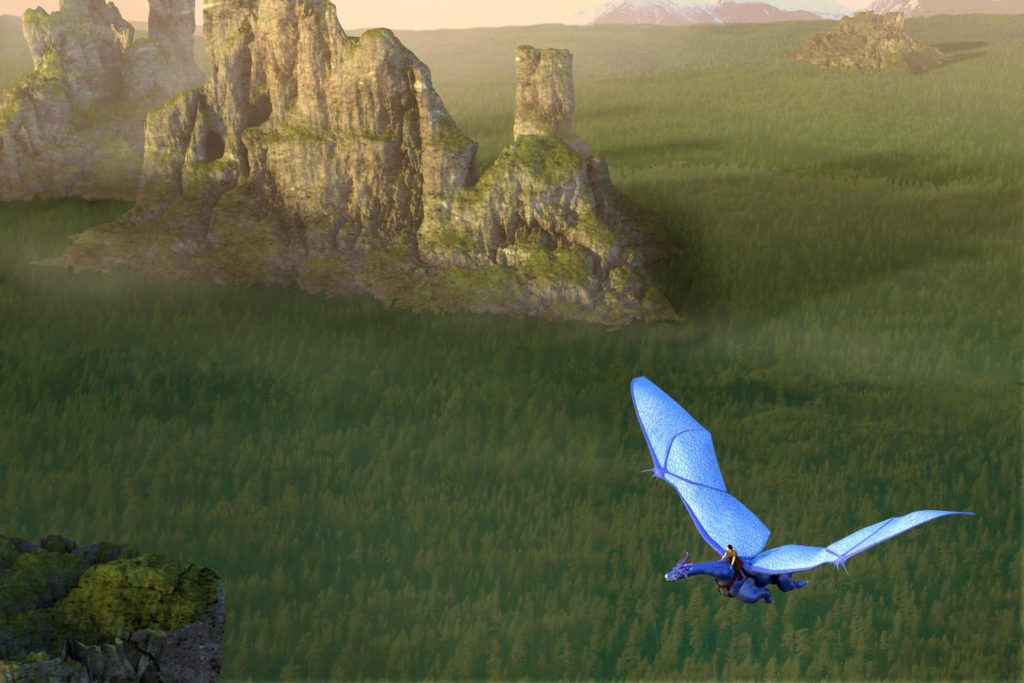
Going to War
Soon after, Eragon found out Nasuada and her army were en route to invade the Empire. Training would have to be finished another time. Eragon, Saphira, and Orik flew back to join the front lines. Orik was quite nervous—never before in history had a dwarf ridden on the back of a dragon. But once his initial discomfort passed, he enjoyed the free nature of flight and passed the hours with Saphira by trading increasingly difficult riddles.
On arriving in Aberon they discovered the Varden had already departed, so they resupplied and headed for the Burning Plains. Having witnessed Eragon’s increasing skill with telepathy, Orik asked him to attempt to read his mind, just to make sure the dwarf remembered his lessons. Orik did well.
They found the Varden among the plains’ fire and smoke, along with roughly 100,000 of the Empire’s troops. After a parade of introductions to King Orrin and his nobles, Nasuada assigned Orik supervision over a group of Ingeitum dwarves who were designing the Varden’s earthen defenses. In the meantime, the Urgals offered Nasuada an alliance in exchange for revenge on Galbatorix. She accepted, a decision that Orik agreed with, despite his initial discomfort working with the warlike race.
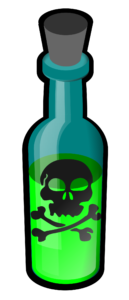
Tensions grew as battle preparations were completed. Orik sought out Eragon, who was sitting with Saphira, waiting. He knew the Rider would likely need some company, and what were foster brothers for, after all? All three were suspicious when they spotted Angela and Solembum sneaking back from behind the enemies lines. Of course, Angela refused to answer much about her mission or whereabouts. Their concern was only alleviated when Nasuada arrived, vouching for Angela’s account that she had been sent over the lines. Later, when howls of agony echoed through the night, the herbalist confirmed she had poisoned as many of the Empire troops as possible. Orik was disgusted, thinking it a cowardly tactic.
The Battle of the Burning Plains finally began. Orik and his dwarves—along with four Kull Nasuada had assigned—protected Eragon and Saphira so they could focus on magical attacks rather than physical ones. (Orik still distrusted the Kull, so was happy to protect Eragon from the danger he thought they posed. His unease with the Urgals alleviated over time.) The fighting was difficult, especially since there always seemed to be two more enemies where one had fallen. King Hrothgar and thousands of dwarves arrived just in time to turn the battle in the Varden’s favor. But not before Hrothgar was killed by a mysterious Rider (later revealed to be Murtagh), who rode the red dragon, Thorn.
The Election of a Monarch
Orik was devastated to lose his adopted father. After extracting Eragon’s promised to slay the assailant, whoever it was, Orik joined those begging the gods to allow the fallen king safe passage into the afterlife and set his mind to the task ahead: electing a new monarch.
Political maneuvering would take the bulk of his energy. Orik was chosen as chief of the Ingeitum after a week of deliberations, but he knew it would not be enough to secure the dwarves continued participation in the war against Galbatorix. The only way to make sure was to become king, which would not be a simple matter. As Nasuada said:
“King Hrothgar was highly regarded by most of his subjects, and Dûrgrimst Ingeitum remains one of the richest and most influential of clans, all of which is to Orik’s benefit. Orik is devoted to our cause. He has served as one of the Varden, you and I both count him as a friend, and he is your foster brother. I believe he has the skills to become an excellent king for the dwarves . . . However, he is young by the standards of the dwarves, and his association with us may prove to be an insurmountable barrier for the other clan chiefs. Another obstacle is that the other great clans—Dûrgrimst Feldûnost and Dûrgrimst Knurlcarathn, to name but two—are eager, after over a hundred years of rule by the Ingeitum, to see the crown go to a different clan.” (Brisingr Deluxe, pages 370-371)
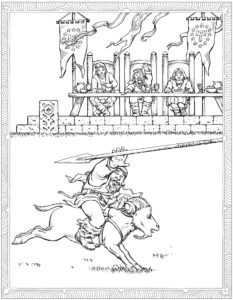
Nasuada sent Eragon to observe the election process, his right as an adopted member of Ingeitum. He made his way to Mount Thardûr to meet up with Orik, who was delighted to see his foster-brother. Orik gave the Rider a tour of the city and shared that he had married Hvedra just two days prior. (Why wait when none of them might survive to the end of the year?) Orik had tried to invited Eragon, but Nasuada refused to forward the invitation for fear it would distract Eragon from more important matters. There was still plenty of time to celebrate though, since the festivities spanned a full week!
Soon it was time for the foster brothers to depart for Tronjheim, but first it was vital for Orik to secure Eragon’s support for his bid for the throne. The dwarf offered to take the Rider to see the Forest of Stone so they could talk privately. Before they departed, Hvedra gave her new husband a horn that had once been her father’s; she hoped it would remind Orik of her in the times to come, especially since their respective duties would keep them apart for the duration of the war.
While viewing the petrified trees, Orik explained that the dwarven clans were on the brink of war, tensions high because of the dwarves involvement with the Varden.
“Those who are opposed to the Varden have blinded themselves to Galbatorix’s threat. They say that if we had refused shelter to the Varden, if we had not accepted you and Saphira into fair Tronjheim, then Galbatorix would have had no reason to make war on us . . . They do not realize that Galbatorix’s hunger for power is insatiable and that he will not rest until all of Alagaësia lies at his feet . . . I will not allow our race to cower in tunnels like frightened rabbits until the wolf outside digs his way in and eats us all. We must continue fighting out of the hope that somehow we can find a way to kill Galbatorix. And I will not allow our nation to disintegrate into a clan war. With circumstances as they are, another dûrgrimstvren would destroy our civilization and possibly doom the Varden as well . . . For the good of my people, I intend to seek the throne myself. Dûrgrimstn Gedthrall, Ledwonnû, and Nagra have already pledged their support to me. However, there are many who stand between me and the crown; it will not be easy to garner enough votes to become king. I need to know, Eragon, will you back me in this?” (Orik, Brisingr Deluxe, pages 419-420)
It was a tense conversation. Eragon’s primary concern was with the good of all Alagaësia, and Orik’s was with the good of the dwarven people. The Rider felt he would back whomever would support the Varden and seemed likely to win. It would mean publicly betraying Orik if this were to come about, so the clan chief offered an excellent compromise:
“Trust me to do the right thing, Eragon Shadeslayer. Give me the same loyalty you would if you were indeed born of Dûrgrimst Ingeitum. Those under me would never presume to speak out against their own grimstborith in favor of another clan . . . If I cannot be king, trust me not to be so blinded by the prospect of power that I cannot recognize when my bid has failed. If that should happen—not that I believe it shall—then I will, of my own volition, lend my support to one of the other candidates, for I have no more desire than you to see a grimstnzborith elected who is hostile to the Varden. And if I should help promote another to the throne, the status and prestige I will place at the service of that clan chief shall, of its very nature, include your own, since you are Ingeitum. Will you trust me, Eragon?” (Brisingr Deluxe, page 422)
It was a difficult decision for Eragon, but he finally relented; Orik’s concern that Eragon would blunder if he were to meddle in dwarven politics–something he had no experience with—was valid.
The deliberations were anything but simple. Orik’s main competitor was Nado of Knurlcarathn (and perhaps Íorûnn of Dûrgrimst Vrenshrrgn as well—her cunning was legendary). Before anyone could propose a vote, it was vital to ensure enough support to secure the crown. Orik set about gathering backers and asked Eragon to hide his impatience.
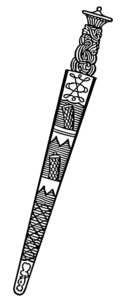
Orik could not have predicted what happened next—an assassination attempt on the Rider’s life. While it was unsuccessful, some dwarves lost their lives while protecting Eragon. No one outside of Ingeitum knew what had happened yet, so Orik insisted the political proceedings halt while he dealt with a “clan-related emergency”; he sent Eragon to the Ingeitum chambers and later to one of the fallen dwarves’ family where he would be safe from further attack.
The investigation used both mundane and magical means. Three accomplices were captured, two of which were mind-broken for information and one left intact to be interviewed by the other clan chiefs. In a space of hours, Orik gathered enough information to confirm who the orchestrator was: Vermûnd of Dûrgrimst Az Sweldn rak Anhûin. Though the deaths of some of Orik’s men were a tragedy, the event did give Orik exactly what he needed to secure the throne—if he manipulated the situation correctly. It was a delicate task:
“Such a betrayal has not occurred in many long years. As an outsider, you cannot know how abhorrent we find it that one of our own should attack a guest. You being the only free Rider left to oppose Galbatorix only worsens the offense. Further bloodshed may yet be necessary, but at the moment, it would only bring about another clan war.” (Orik, Brisingr Deluxe, page 484)
Before the meeting, Orik secretly stationed one hundred of his men in a nearby corridor, just in case things went awry. He was convincing in his accusations and, after they confirmed the facts, the other clan chiefs agreed with his conclusions. Vermûnd threatened war if any were to take action. So Orik suggested something no one else had thought of, something he had planned on since the assassination attempt: the entire clan of Az Sweldn rak Anhûin would be banished until such time as they decided to admit their actions, repent, and oust Vermûnd, who would be banished for life for his actions. All present—except Vermûnd, of course—were in favor. As soon as the disgraced clan leader left in a fit of rage, Orik proposed a vote for the next monarch to take place in three days. Everyone once again agreed.
After a feast to celebrate their success, Orik used the remaining time securing as much support as possible. He gave Eragon permission to summon Saphira, much to the Rider’s delight.
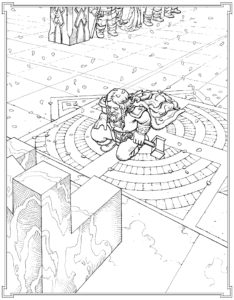
The vote was tight. In the end, Íorûnn broke the tie by choosing Orik, much to his relief. (Of course, he would likely need to reward her with a position on his council.) The coronation was set for the next day, quite a bit sooner than normal. Orik had sent for Hvedra with just enough time for her to arrive for the ceremony. The proceedings were stunning–complete with the blessings of an unknown entity the dwarves called Gûntera. The god-like being asked Orik three questions and was satisfied with his answers. A golden crown, the same Hrothgar had worn, appeared on Orik’s head, and Gûntera disappeared. (Interestingly, Orik hadn’t known for sure whether the god would approve, though the dwarf wasn’t too worried—it would have been foolish for Gûntera to throw the nation into chaos by denying him. That said, there were moments in history when heretic kings and queens had insisted on ruling without the approval of Gûntera; their reigns were usually short and unhappy.) What followed was a long line of dignitaries pledging loyalty and then a round of gift giving. Perhaps the most treasured gift Orik received was Saphira mending Isidar Mithrim. His thanks were sincere:
“On behalf of our entire race, I thank you for your gift, Saphira . . . from now until the end of time, your name shall be recited at the winter festivals, along with the lists of Master Makers, and when Isidar Mithrim is returned to its setting at the peak of Tronjheim, your name will be engraved in the collar surrounding the Star Rose, along with that of Dûrok Ornthrond, who first gave shape to the jewel.” (Brisingr Deluxe, page 561)
Back to War Again
It wasn’t long before Orik and his forces had rejoined the Varden outside Dras-Leona. One day Eragon found him muddy and in the process of creating an Erôthknurl. It was the dwarf’s way of coming to terms with the obvious changes in his friendships now that he was king—they could not forgot his station any more than he could. He said:
“Used to be, I could drink and play dice with the others of mine clan, and it mattered not that I was Hrothgar’s adopted heir. We could still talk and laugh together without it feeling uncomfortable. I asked for no favors, nor did I show any. But now it is different. My friends cannot forget that I am their king, and I cannot ignore how their behavior has changed toward me . . . life is a strange, cruel journey sometimes. . . . I admired Hrothgar as a king, but it often seemed to me that he was short with those he dealt with when he had no reason to be. Now I understand better why he was the way he was.” (Inheritance Deluxe, page 219)
As the two talked about dwarf politics and the whereabouts of the shunned leader of Az Sweldn rak Anhûin, Vermûnd, Orik cheered up. It was good to be able to freely discuss things with his foster brother.
Dras-Leona proved a challenge to conquer. Jeod Longshanks eventually posited the existence of a secret dwarven tunnel underneath the city; using that information Orik was able to predict where it would be, based on the local soil and rock compositions. Eragon and a small party infiltrated Dras-Leona from below, and the city was ultimately won.
The victory was short lived. A small raiding party infiltrated the Varden camp, intent on capturing Nasuada. Eragon, Arya, Saphira, and Orik did their best to stop the kidnapping but were unsuccessful.
The leaders met in Orik’s pavilion to decide whether to honor Nasuada’s wish that Eragon be her successor. All there were in favor. (That is, with the exception of King Orrin of Surda, who coveted the position for himself. Orik certainly didn’t care for the human king’s petulant, drunken behavior.)
Eragon, Saphira, and Glaedr (in his Eldunarí) then made a secret trip to Vroengard, following clues they hoped would lead to some kind of weapon against Galbatorix. The human king was still too powerful for them to have any hope of defeating him.
The trip to Vroengard was a success. The trio surreptitiously returned with over one hundred Eldunarí from the Vault of Souls. Orik and the rest of the leaders were summoned in secret to discuss the results of the visit and plan a course of action for the assault on Urû’baen. Hopefully it would be just enough to defeat Galbatorix.
The main Varden forces, the elves, and the dwarves (under Orik’s command) led the main assault on the city, while Eragon and his team infiltrated the citadel. Taking Urû’baen was a mighty challenge, especially with the magical wards Galbatorix had set in place. General Barst, who had been augmented with the power of a captive Eldunarí, wrecked havoc on the Varden forces, so Roran hatched a plan to batter the lord until his wards gave out, however long it took. Just as directed, Orik and a group of his dwarves took control of catapults to send a volley of boulders—guided with magical assistance from the elves—at the general. Urgals took turns hammering away as well. The ploy worked, and with considerable effort, Roran killed Barst. The city was taken quickly after that. For their part, Eragon, Saphira, and the rest were able to defeat Galbatorix. The war was finally over and won.
After the immediate demands of securing Urû’baen were addressed, it was time to choose a new ruler. Orik, Eragon, the elves, Urgals, and werecats were instrumental in ratifying Nasuada’s petition for the throne over Orrin’s claim.
Life After
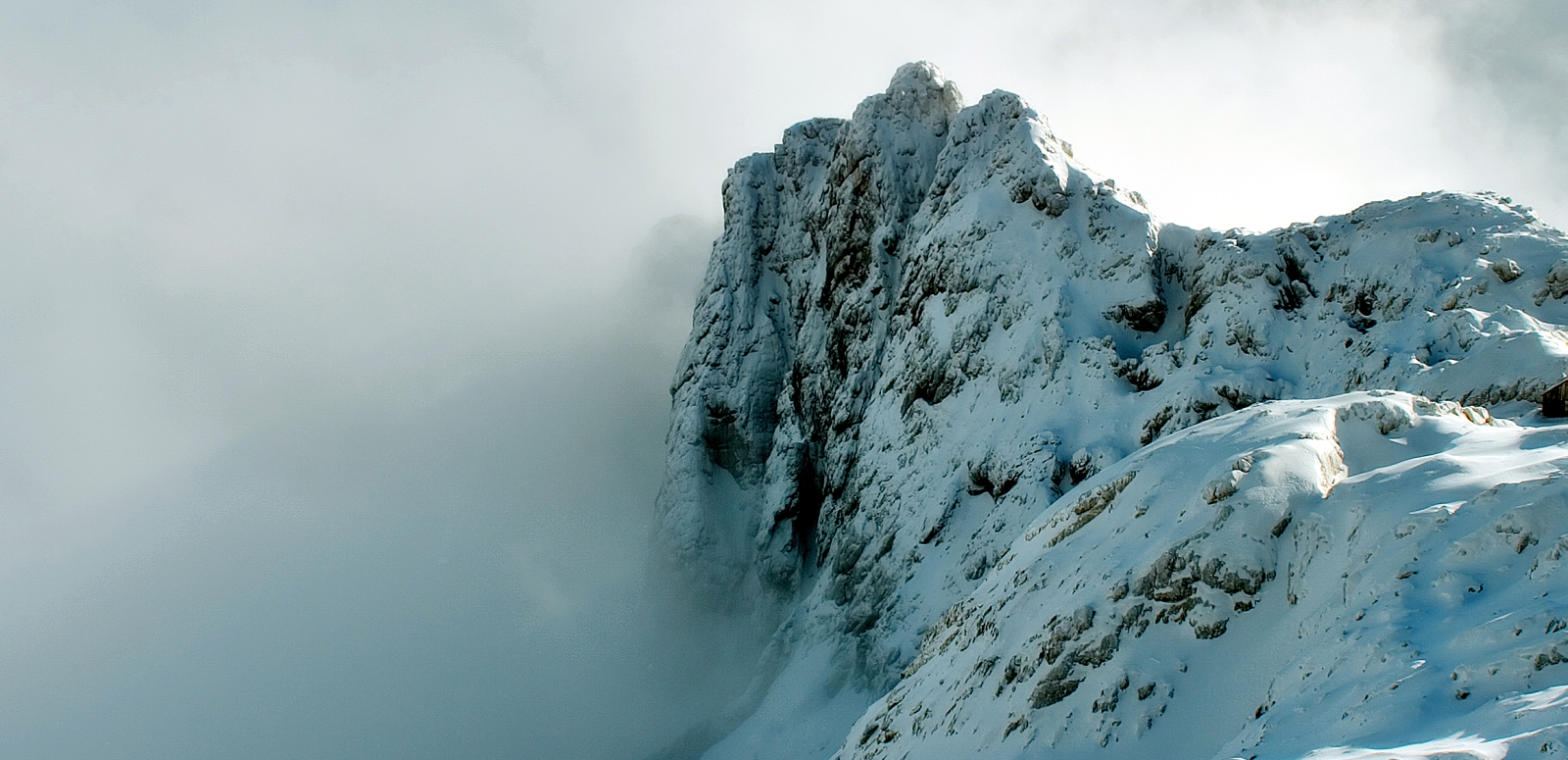
Things settled enough for Orik to return to the Beor Mountains at the first snowfall. He later received Arya, Fírnen, Roran, Katrina, and Ismira as guests at Tronjheim. When Eragon visited to inform Orik of his plan to leave Alagaësia and establish the Dragon Riders in the lands to the east, the king approved. More importantly, he also consented to include dwarves in the Dragon Rider pact alongside elves, humans, and—if they decided to join as well—the Urgals:
“If you had asked this of any of the grimstnzborithn before me, they would have said no. Had you asked me at any time before we invaded the Empire, I would also have said no. But now, after having fought alongside the Urgals, and after having seen in person how helpless we were before Murtagh and Thorn and Galbatorix and that monster Shruikan . . . now I no longer feel the same . . . It may cost me mine crown, but on behalf of knurlan everywhere I will accept—for their own good, whether or not they realize it.” (Orik, Inheritance Deluxe, page 826)
History will likely reflect well on his decision.
Orik later rode out to meet the Rider and his dragon in Hedarth before their departure to the east. They feasted joyously for two days and many enjoyed the delicacies of the Beor Mountains, most notably mead (three wagons of the finest for Saphira!) and wild boar (the largest of which the king had killed himself). Orik also gifted Eragon with a cask of gold and gems, and gave Saphira an enchanted ring that wouldn’t scratch, stain, or allow her prey to hear her coming. All too soon it was time to leave. The two foster brothers embraced for the last time, and then the Rider headed to the east and Orik to the southwest.
Many adventures are surely ahead for King Orik. In the meantime, he certainly has his hands full navigating the intricacies of dwarven politics . . . .
DESCRIPTION
Before becoming king:
“It was not Murtagh standing by him but a diminutive man no taller than his elbow . . . The dwarf was busy wringing water out of his long braided beard. His chest was stocky, and he wore a chain-mail jacket cut off at the shoulders to reveal muscular arms. A war ax hung from a wide leather belt strapped around his waist. An iron-bound oxhide cap, bearing the symbol of a hammer surrounded by twelve stars, sat firmly on his head. Even with the cap, he barely topped four feet.” (Narrative, Eragon Deluxe, pages 376-377)
After becoming king:
“His beard was brushed and curled, and he wore buskins of the finest polished leather with silver spurs mounted upon the heels, gray wool leggings, a shirt of purple silk that shimmered in the lantern light, and, over his shirt, a mail hauberk, each link of which was wrought of pure white gold. A long ermine-trimmed cloak embroidered with the insignia of Dûrgrimst Ingeitum flowed over Orik’s shoulders and onto the floor behind him. Volund, the war hammer that Korgan, first king of the dwarves, had forged, hung at Orik’s waist from a wide, ruby-studded belt. Because of his lavish raiment and his magnificent armor, Orik seemed to glow from within; to look at him dazzled Eragon’s eyes.” (Narrative, Brisingr Deluxe, page 554)
Like this article? Check out the rest of the Encyclopedia Alagaësia series!


